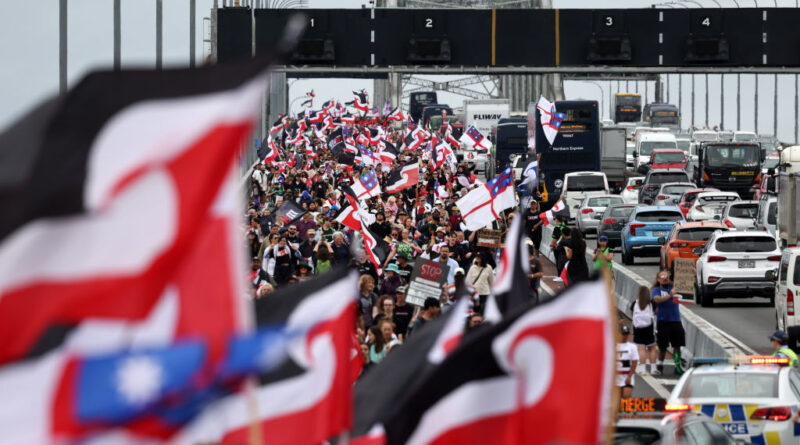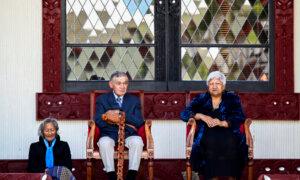Protesters Take a Stand on Auckland Harbour Bridge to Oppose Bill Threatening Indigenous Rights
Protesters are marching from the top of the North Island and bottom of the South to meet in Wellington, causing disruption as their numbers grow.
Protesters are objecting to the introduction of the ACT Party’s Treaty Principles Bill, which aims to codify and, in some cases, override decades of common law on the Treaty of Waitangi. This caused two northbound lanes on Auckland’s busy Harbour Bridge to be closed this morning.
The Treaty of Waitangi, considered the founding document of New Zealand, was signed between the British Crown and most Māori chiefs. There are two versions—one in English and one in Māori—and they do not say exactly the same thing.
The bill seeks to define the terms of the Treaty according to their meaning “at the time they signed it,” with ACT Leader David Seymour aiming to cancel unique rights given to Māori people based on more modern interpretations of the treaty.
The NZ Transport Agency and Police decided to close the lanes to separate the growing number of marchers from rush hour traffic.
While the closure caused gridlock for motorists heading south into the CBD in the morning, many seemed supportive, tooting in support. The bridge was fully reopened by midday (New Zealand time).
Streets in downtown Auckland were then crowded as protesters made their way through the city to one of two meeting spots.
Thousands of people joined the march—one of two happening simultaneously—and it took several hours for them all to cross.
The first group was led by former Labour MP John Tamihere, now president of the Māori Party, in groups of 250. Video shows the bridge swaying due to the number of footfalls. Māori Party co-leader Rawiri Waititi was among the marchers.
Other protesters made their way across the harbour in waka (traditional Māori canoes) and small boats.
Senior Labour MP Willie Jackson estimated the number at “10,000, maybe more,” although police put it at around 5,000.

Te Pati Maori co-leader Rawiri Waititi leads a Hikoi (march) across the Auckland Harbour Bridge on day three of a nine-day journey to Wellington on Nov. 13, 2024. Fiona Goodall/Getty Images
Another group of people is heading from the bottom of the South Island, and the two groups plan to converge on Parliament to protest the introduction of the Bill.
Activists, academics, and lawyers have criticized the bill for overturning decades of decisions made by the Waitangi Tribunal and the courts, which have interpreted the Treaty for decades.
Protesters say they are also against other government policies that undermine the rights of Māori.
While the largest party in the coalition government, National, opposed the policy during the election campaign, it agreed during coalition negotiations to support the Bill being referred to a Select Committee.
Prime Minister Christopher Luxon has repeatedly said National will not support it past its first reading, making it unlikely to gain enough support to become law.
Last week, the Waitangi Tribunal stated that the Bill represented “the worst, most comprehensive breach of the Treaty in modern times.”





